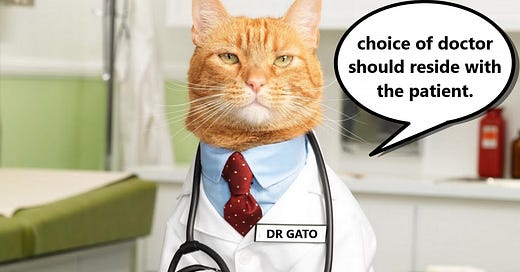mark cuban has been having a busy day on twitter.
he led off with this missive which, especially in light of his having bravely disallowed comments, has been getting him dragged in the quote tweets all day.
it's amazing to me that even after this number of uncontestably catastrophic fails, the cult of expert worship persists, but is would seem there is just no extinguishing the authoritarian flame in some folks.
this is very much on brand for cuban who earned no small notoriety during covid restrictions for literally hiring a team of snitches to go out and busybody their way around to see if businesses were “complying” and then wrote a crowing blog piece about it. (of course, you’ll now need to use the wayback machine to find it because he took it down. but THE INTERNET REMEMBERS.)
gatopal™ erich has the rest.


i have long suspected that the very rich and powerful love authority and regulatory structures because they tend toward status quo and when you’re at the top, that’s good for you. and the rules probably don’t apply to you anyhow. but this is not really the interesting part of mark’s day.
that came when he took exception to some comments by long time gatopal™ and rational ground grounding rod justin hart.
and this is simply too great a “simplico” straight man line to lay off of because while mark’s argument is both orthogonal and a straw man, it’s also one near and dear to my heart and so i’d like to chime in on this issue:
let me make that easy for you:
yes.
they serve only to raise prices, protect guild systems, stifle innovation, limit freedom, and limit choice.
any credential/skill that is truly important will be demanded by the market anyway.
let the customer decide, not the bureaucracy.
make all commerce, association, and interaction voluntary and consensual.
what should med or law school look like?
let the market decide not some technocrat in a regulatory agency who has much to gain by promoting scarcity and lack of choice.
you would not accept this rationale in most aspects of your life. imagine a “marriage panel” the decided who you were allowed to consider wedding. lots of people seem to get it wrong. for many, it’s very expensive. so should “experts” be in charge?
the ethical basis of mandatory credentialing is just as bad.
it’s just taking choice away from you and calling it “public good.”
hardly a practice with a laudable history.
it’s deeply ironic to see a guy who got rich helping to disintermediate over-regulated and ossified media now weigh in in favor of ossification.
and the magnitude of the straw manning he’s using to do it is going to leave herds of horses hungry.
no one is saying “hey, just trust any old person do to heart surgery or fly your airplane.”
to claim so a silly grandstanding move.
everyone will seek out qualified people.
that is not the issue.
the issue is “who gets to decide what constitutes “qualified”?”
and mark does not seem to want it to be you.
i mean, really stop and think about this: do you trust just anyone with an MD or a JD?
if you care about "credentials," great, patronize those who decide to get them. if you don't, don't.
make it all voluntary and then, like iso-9000, if people care, it will be supplied. in the absence of regulation, accreditation, and other such interference and restrictions on consensual commerce, what the market demands the market gets.
and that is a VERY powerful idea.
licensing lawyers is no different than having a produce czar decide who can grow vegetables, under what conditions, and how many of which they should produce.
it’s trade restriction.
and trade restriction always creates a net deadweight loss for society.
you might have some idea of “how trained a doctor should be” and i might have one too. and they might be different. but in a free market, each of us can satisfy our desires and offerings can evolve to suit demand.
in a market captured by guilds, we cannot. there is only one answer and it provides a high hurdle and a built in system of grift and apprenticeship where it costs people huge money to become a doctor and then they have to work for peanuts for years in “residency” that’s basically medieval style guild apprenticeship.
such a system does not innovate. it does not allow in ideas like AI (that is already outperforming doctors on many tasks including diagnosis) or ideas like “maybe a doctor who is just going to perform lasik does not need a full MD” or “maybe we should be teaching a different curriculum more based in critical thought and assessment rather than rote regurgitation” or “maybe we need more pharmacology and less physiology. or maybe the obverse.” you’re not even really getting “one size fits none.” you’re getting “one size fits guild needs.”
such a system will always seek to over-price access and then constrain supply because that is what maximizes oligopolistic/monopolistic profits.
and this is EXACTLY what they have done. med school and residency batter the hell out of students, push rote learning over critical thought, and leave graduates beholden to boards and credentials and generally in nasty debt.
the schools thrive, the hospitals thrive, the regulators thrive, and if once they manage to milk enough “dues paying” out of you, so too might an aspiring doctor one day but not until they have extracted massive guild profits from you and never without continuing to be under their thumb. california’s new foray into overt medical censorship by holding credentials hostage shows just how powerful and intrusive this can get.
honestly, it’s quite reminiscent of some other monopolies, like, say, professional sports where entry into leagues is rigidly regimented, draft players do not get to pick which teams they join, and nearly all young players get FAR less than their market worth for the first several years they play.
hey, wait, doesn’t mark own a basketball team?
huh.
this whole notion is just more “expert worship” and the core socialist fallacy of “we just need smarter guys to make top down planning work next time!”
no, we don’t
that never works.
it breaks choice and constrains supply according to what an industry wants rather than what its customers do.
it’s a recipe for stultification and profiteering. it’s a recipe for perpetual guild domination where innovation should be.
medicine in particular is predominantly a technology field. it should be dropping in price, not exploding and the fact that it is not speaks to market breakage.
guilds are market breakage.
giving someone else the power to determine for what and under what conditions you can hire the services of another person is market breakage
the only reason to require such things to sustain a non-market equilibrium.
it’s really that simple.
it’s clear why so much “big business” wants that.
but why do you want that?
you don’t. it’s being sold as illusory safety.
you are surrendering freedom and consumer sovereignty for a cage built by profiteers.
and we all know how that goes…











The LAST person I would ask for medical advice after these last three years, is a DOCTOR!
What has me perplexed is the people who believe physicians have the expertise to weigh in on the efficacy of vaccines, meds, or masking. They don’t get thorough training in research. The drug reps tell them which drugs are safe and effective. And all their drugs supposedly are. They only know if their own patients have a bad experience and only then if they return to them for care. It would take lots of such patients for a physician to identify a red flag.
I’m not saying we can trust researchers whose bread is buttered by Big Pharma either. Even if we can, pharmaceutical companies present their data in a favorable way to their partners in the FDA. Unless we have truly open review as you’ve suggested, there is no “expert” group to consult on these issues.